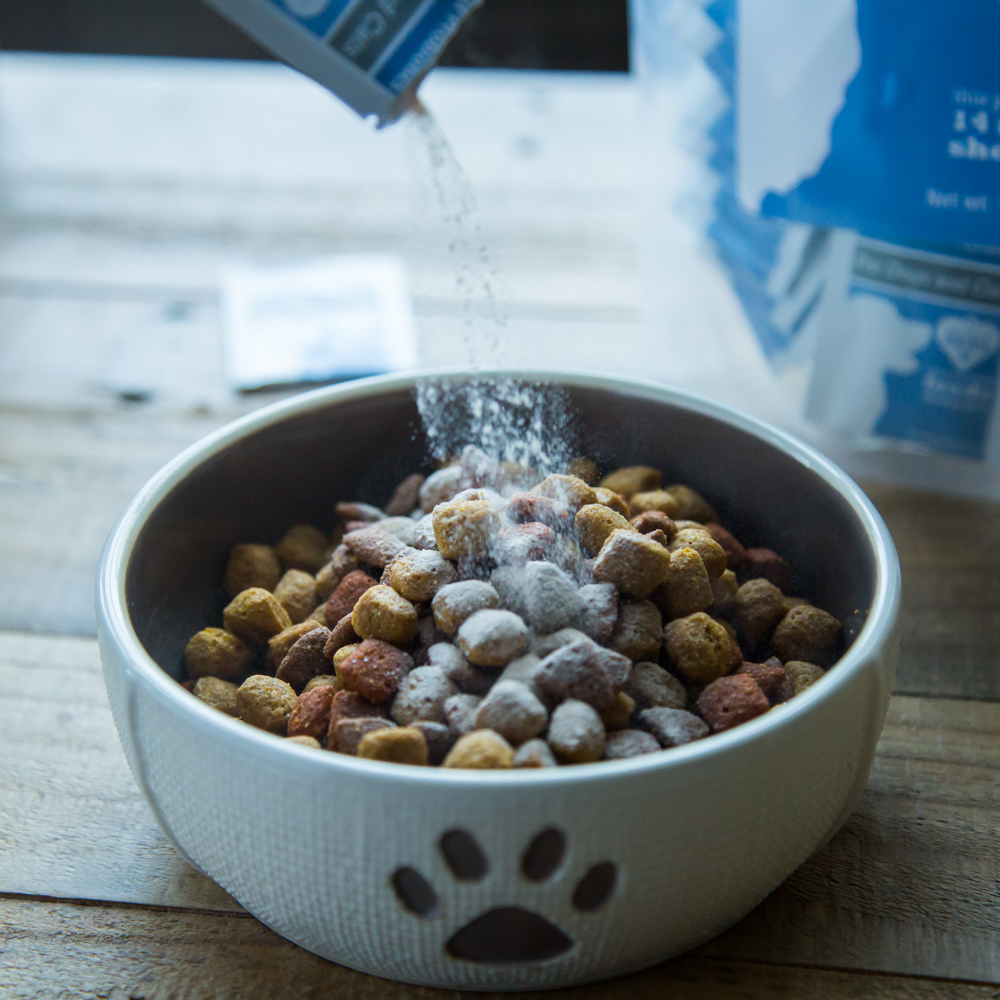
Is your dog exceptionally gassy? Do his farts make you gag and want to run from the room? While gas is normal in all animals, at some point it becomes more than just a nuisance and you start to wonder if there’s something wrong with your dog’s digestion. After all, it is the process of digestion that causes gas. Is there anything that can be done to help cure those horrific farts? The answer is yes, and it might be something you take yourself.
The answer is probiotics.

According to the AKC:
“The term [probiotic] refers to beneficial or ‘friendly’ gut-dwelling microbes (bacteria and yeasts). There are billions of them in the gastrointestinal system of all animals, and they aid in the digestion of food, fight off potential pathogens, make nutrients and vitamins, and bolster the immune system.”
If you’ve ever taken antibiotics, you’ve probably been recommended to take a probiotic to help replenish the good bacteria in your gut since antibiotics kill all bacteria, not just the bad ones. You’ve also probably seen commercials advertising yogurt that claims to contain helpful bacteria to aid in digestion. New research is showing that dogs can benefit from probiotics just as much as people can. According to PetMD:
“In a peer-reviewed journal, Marcella D. Ridgway, VMD, MS, DACVIM notes that there is growing evidence that supports the use of probiotics for dogs. She states that giving your dog healthy bacteria may positively impact chronic GI abnormalities, obesity, liver disease, and mood and behavior disorders. A daily probiotic supplement may also provide some ancillary benefits for dogs such as better skin and coat appearance, a reduction in gas, improved breath, a reduction of allergy symptoms, a reduction in yeast-associated disorders, and help in regulating bowel function.”
RELATED: Which probiotic product does iHeartDogs Recommend?
Since probiotics aid in digestion, they can also help dogs who are prone to diarrhea. If your dog is especially prone to stress-related digestive problems, a probiotic can help reduce the likelihood of symptoms and clear up diarrhea faster than doing nothing and may reduce the need for an antibiotic.

Not all strains of probiotics are created equal. The following strains have been shown to be beneficial and safe for dogs:
– Enterococcus faecium
– Lactobacillus acidophilus
– Lactobacillus casei
– Lactobacillus plantarum
– Bifidobacterium bifidum
– Bifidobacterium animalis
– VSL#3

So how should you go about adding probiotics to your dog’s diet? Luckily there are several foods that include probiotics naturally. According to The Bark:
“Yogurt, kefir, onions, bananas, garlic, honey, leeks, kimchi and Jerusalem artichokes all appear regularly on lists of probiotic foods. Some of these items are not ideal for dogs; for example, onions and large quantities of garlic are dangerous and should be avoided. Kimchi is too spicy. The jury is out on dairy products, yogurt included. Some literature contends that dairy causes digestive upset in dogs, but a better part of the homefeeding community includes yogurt in their dogs’ diets to great effect.”
Green tripe is also a highly-recommended food for your dog as it has many health benefits and is easily digested.
RELATED: 6 Things To Consider Before Purchasing a Probiotic for Your Dog
If you want to be certain just how many and which strains of probiotics that your dog is receiving, you might prefer to go with a probiotic supplement instead of relying entirely on food. There are plenty to choose from on the market today. And while it may be OK to share the probiotics you take with your dog, it’s generally considered safer to give your dog a probiotic that’s formulated specifically for dogs.

What should you know if you choose a probiotic supplement instead of trying to include enough probiotics through food alone? According to Whole Dog Journal:
“Many products, particularly those that are not refrigerated, contain fewer live organisms than their labels claim. Freeze-dried probiotics may last longer than refrigerated or other powdered products, especially if the powder is exposed to moisture (such as when the container is opened and closed). Probiotics in commercial foods may not survive processing or storage. Probiotic products should always provide an expiration date.”
Not only will your dog thank you for aiding his digestion and improving the quality of his life with a probiotic, but his stinky farts should resolve, which improves your quality of life also!
Learn More About the Probiotic Formula Recommended by iHeartDogs
These statements have not been evaluated by the Food and Drug Administration. This product is not intended to diagnose, treat, cure, or prevent any disease. The information on this website is not intended to replace a one-on-one relationship with a qualified health care professional.
(H/T: PetMD, AKC, The Bark, Whole Dog Journal)
via Whisker Therapy
